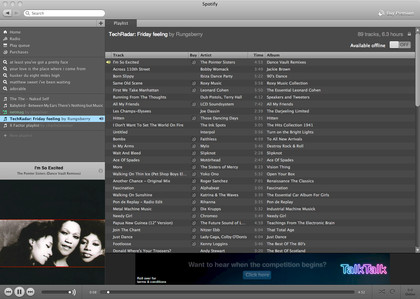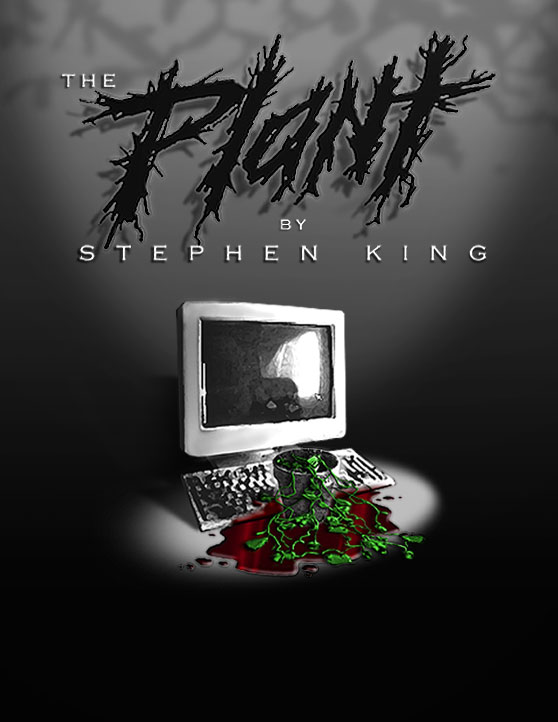Could Spotify's business model work for ebooks?
Free services and social networking could boost take-up
Spotify isn't just about streaming music: it's a social service, too, enabling people to publish playlists or collaborate on group playlists.
That's a powerful sales tool, so of course publishers are paying attention. "I think there has been some excitement amongst the bigger publishers about what potential there might be in social networks based around books," Lloyd says.
"There have been various experiments in that area, such as HarperCollins' Book Army or Random House's Readers' Place. My own view is that generic, 'book lover'-based social network sites are strategically uninteresting, because 'book readers' are not part of a self-defined niche who are itching to interact and share with each other online just within the 'box' of reading and books."

SHARED TASTES: One of Spotify's best features is its collaborative playlists, which enable you to enjoy or mess with other people's musical ideas
So a Facebook for books probably won't work - but that doesn't mean book-focused social networking is a bad idea. "What can work, though, is online communities around particular genre-based niches," Lloyd says. "For example, Macmillan's Tor.com is a SFF [Sci-Fi/Fantasy] category site. It's publisher neutral and features original content created specifically for the site as well as blog content from authors. It's been a huge success."
The combination of such a network and a subscription service could be amazing. Your favourite authors could create book 'playlists' of their influences or recommendations, enabling you to download the books immediately - and helping publishers to sell older titles.
The trick is to keep computers out of it as much as possible. "I think that person to person recommendation is powerful and more interesting than automated recommendation engines, which ultimately tend to offer you more stuff like the stuff you've already tried rather than challenging you to try something new, so a streaming service that is primarily about accessing/purchasing the content but [that] has social networking features built in is attractive from that perspective."
Get daily insight, inspiration and deals in your inbox
Sign up for breaking news, reviews, opinion, top tech deals, and more.
Back to serialisation?
It's been suggested that ebooks could also herald the return of serialisation, with books published in regular instalments just as they were in Dickens' day.
However, as horror master Stephen King has found out the hard way, online audiences don't seem too keen. Perhaps the problem was simply one of payment: when King wrote The Plant in 2000, he vowed to stop if fewer than 75% of readers paid for it. Fewer than 75% paid for it. He stopped.

BIT BY BIT: Stephen King's 2000 attempt at ebook serialisation wasn't a success - but a subscription service might give authors a way to make money in instalments
"I'm still not convinced by the serial idea, and I think maybe it is more a cultural than a technical issue… maybe around certain niches this would work," Lloyd says.
"It's like the way everyone says digital will bring back the short story. I don't agree with that either because I think short stories - in our markets at least - are generally not satisfying enough for the majority of consumers. But if you asked Harlequin, who are romance publishers whose business has moved online massively, their digital shorts at a really low price sell very well.
"That's because in the case of that market, generally female romance readers, the ease and convenience of a short online story appeals to them, either as something to read at their desk in their lunch break or on their mobile or PDA while they sit at the kid's soccer match, for example."
"This is a really good example of using digital to deliver to a particular market in a way that fits in with their lifestyle. But it wouldn't work for every market; it's a case of ensuring you don't do things just because digital enables it -- you need to customise the delivery and the experience to suit the market."
Mark Mulligan believes that the move to digital will split the book market in two. "Uptake will polarize book audiences," he predicts. "Aficionados with densely stacked booked shelves will cling onto the physical form factor longer than music aficionados have clung onto the CD (though perhaps equal to vinyl fans). Those who skew more towards best sellers will be low hanging fruit for a subscription offering."
Lloyd agrees that in ebook publishing, one size definitely does not fit all. "I think like all interesting and emerging digital media markets it'll be a mixture," she says.
"People will test out different ways of accessing and consuming ebooks and then either settle on their preferred method or go for different modes for different aspects of their book reading. For example, with music, some people use Spotify like the radio, to test out new stuff, but download from iTunes the stuff they're really interested in 'owning' or keeping long term."
Writer, broadcaster, musician and kitchen gadget obsessive Carrie Marshall has been writing about tech since 1998, contributing sage advice and odd opinions to all kinds of magazines and websites as well as writing more than a dozen books. Her memoir, Carrie Kills A Man, is on sale now and her next book, about pop music, is out in 2025. She is the singer in Glaswegian rock band Unquiet Mind.
